November 11, 2017 / wanderinglightning / 0 Comments
blessed be blessed be blessed be
the short day’s hike this bed for me the water man
on this camino this plastic chair along the way
my life and softest grass his wall
or the distance beneath my aching strung with the scallop shells
to you and my feet is open, peregrina
If you only get lost a little, and come out ahead, is that really getting lost, or is it the fortune that favors the bold?
The stairs out of Pobeño rose so long and steep, I looked at them and laughed. A hillside of stairs. And so I climbed. And at the top, and all day, a view of the sea.
Not just a bay, or a port, but the wide open ocean rolled majestically beneath me, wider than the reach of my outstretched arms, opening below my tentative heart in infinite waves, upon waves, upon waves. Initially awed into silence, I stood atop a cliff, watching, mesmerized, until at last, I lost all track of time and stepped within a great stillness.
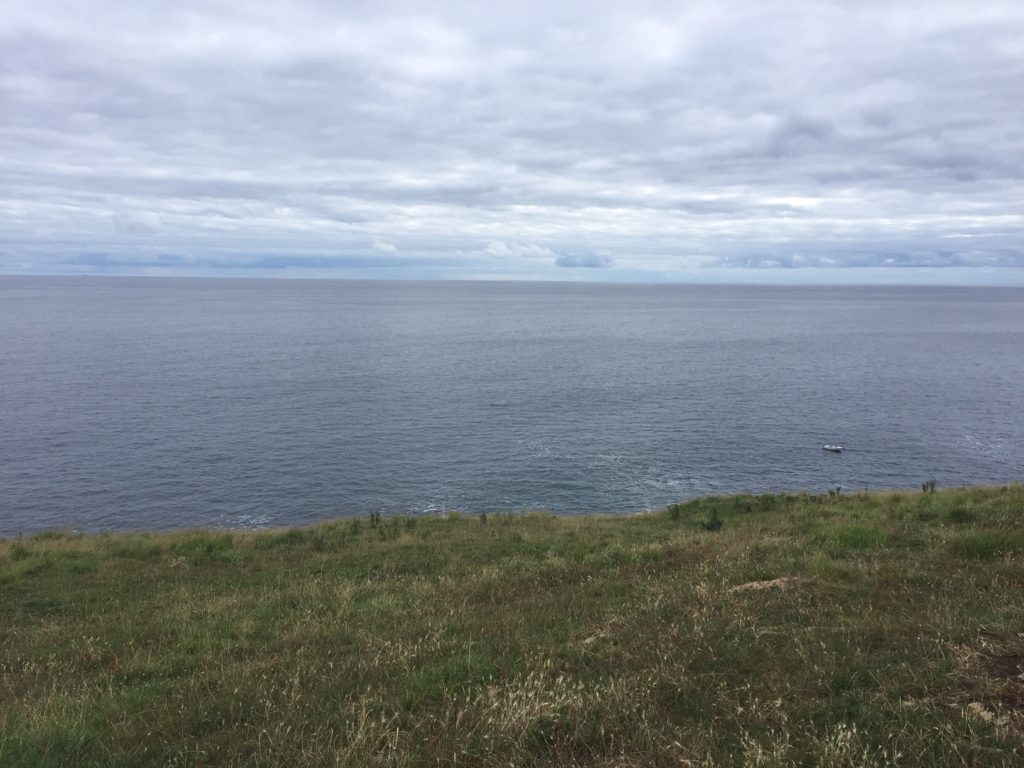
The calm was profound. Grounded in the rock of being, in the confidence of being alive, I breathed. While the expansive skies of my youth had encouraged me to dream of navigating adventures, the sea quieted my mind. The moving depths showed me the enormity of reality; my worries or grievances were nothing but footsteps on a beach, wiped clean and smooth with the languid roll of one wave, all insignificant in a landscape of true proportion.
It wasn’t just the sky that was vast; nor was it only the sea. I was understanding that Life is vast. Physically changing my view point was guiding a change in my spiritual perspective. I felt like a small stone upon the sand. The Camino was slowly smoothing the rough edges of cynicism, and softening my fears of dreams defeated by relentless Time.
* * * * * * * * * * * * * * * * *
Thank goodness, last night, at the albergue where the beds were tightly packed in the rooms, I sat outside a long time, where Miguel asked to look at my walking stick. He greeted me: “Barbara, I see you walk with two sticks now?” I told him I was trying this out, because my original stick had a crack, and I didn’t want to be without. But I wasn’t sold on my new option.
Miguel was a woodworker and artist. I handed him the new, straighter but heavier stick I had found along the path, saying, “I need to peel off all this bark.” He quickly shook his head.
“No. No, this is not so good. Besides – you are carrying a friend with you.” At first I thought he meant my walking stick, Saint Thomas, but then he showed me a hole in the end of the new stick that some beetle or worm had made. Making a face, I tossed the stick away from us all, and several nearby peregrinos laughed.
“Saint Thomas has a crack? May I see?” He examined the slightly irregular stick with the smooth touch of his expert hands. It was dry and light, and upon examination, the crack appeared old. “This is good wood,” he reassured me. “It will last for some time, maybe even all the way to Santiago, if you wrap it, here, where you place your hand? What is this called?”
“A grip,” I offered.
“Yes,” Miguel said, handing back Saint Thomas. “You make a grip by wrapping here with string. Then your hand will hold your stick together.” He rummaged in his pack and gave me day-glo orange cord.
I sat at a nearby table, “getting a grip” so I could “hold it together,” which made me smile. As I tightly wrapped the cord, careful to keep it straight and smooth, I felt great affection for Miguel, who could understand that I was becoming fondly attached to my old walking stick. He told me about the small, beautiful items he loved to make from found wood, or from repurposing scrap from a guitar maker, sanding his pieces until they felt soft and alive. He nodded approvingly when I finished getting a grip.
* * * * * * * * * * * * * * * * *
Mioño offered an inviting taverna midday, where I sipped coffee and studied my guidebook. It noted, “Those who prefer to enter Mioño can rejoin here by following a minor road off of the highway.” Mioño is a tiny village, so all the roads are minor roads – no guidance at all, really. I asked two women at the cafe, and they said to follow the road…so I followed the road. The cafe road. Which became the highway.
It was a good thing Miguel had looked at my stick. Now, as I walked up the narrow but busy road, I held Saint Thomas up like I was leading a pilgrim processional (of one), his orange grip raised above my head, stick resting on my shoulder, the overall effect of my banner like a caution triangle on the back of a slow-moving tractor. So Miguel may have saved me from being hit by one of the trucks or buses usually ignoring pedestrians as well as the lane lines.
Finally, I reached Castro Urdiales, and yellow arrows directed me through a new neighborhood, where a construction crew was building several apartment buildings. I wound my way through cranes, brick stacks, slabs of cement, forklifts, and dump trucks, stopping to wait for equipment backing up, moving loads; I stood, all alone, once again skeptical that my route was correct, distrusting my way.
And yet I did trust my way. I knew it was right; it just looked crazy. I held on to Saint Thomas, that supportive friend through doubt and disbelief, and kept going. I passed the long dumpster filled with iron, glass, drywall, rock and broken wood, and stopped to ditch some more extra weight from my pack. As I reached the end of the construction site, I saw that I was coming out on a hill above the sea again. A coastal path led down and around to the old part of the city. I started down, and suddenly, over the hill behind me came peregrinos I had walked with earlier in the day. We called out greetings and walked down into the city together.
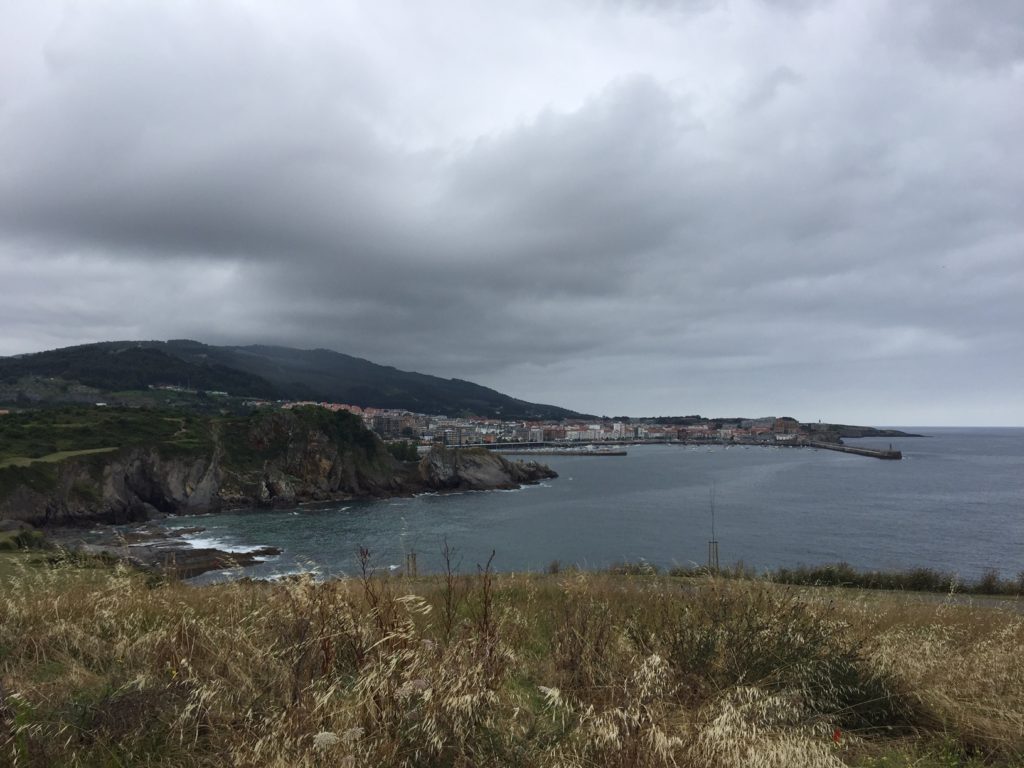
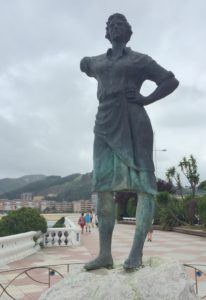 I got a gelado on the beach promenade, licking it beneath the huge statue of the working woman, her apron tucked up, her arm missing like all good classical statuary. She was strength personified, larger than life, and I immediately loved her.
I got a gelado on the beach promenade, licking it beneath the huge statue of the working woman, her apron tucked up, her arm missing like all good classical statuary. She was strength personified, larger than life, and I immediately loved her.
But I think I loved my ice cream just a little bit more. It was soft and sweet, smooth on my tongue, cool and gentle down my parched throat. I kept a good grip on the cone, and on Saint Thomas, and walked happily down to the beach.
November 9, 2017 / wanderinglightning / 0 Comments
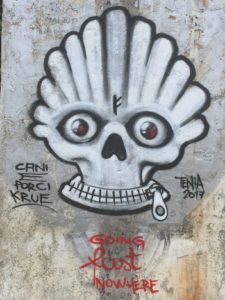
The rune Fehu is painted on the forehead of this Camino scallop shell skull. Fehu is the rune of wealth that is in motion – good things given, good things received. Good shared.
6. Share your food; this brings stories.
7. When people tell their stories, listen deeply.
8. Tell your own story in small bites – let people ask questions.
9. Soft, thin skin is not ideal.
10. Give it all away.
November 9, 2017 / wanderinglightning / 0 Comments
the way is easy,
the pack is light;
flowers bloom –
take delight!
— “What the Butterflies Say,” from Gorma Tales of the Camino
I whistled while I hiked into Bilbao. At the top of the high hill overlooking the city, I saw signs to the pricy hotel I had booked for my last night in Spain, two months from now. I didn’t want it any more. One week on the Camino had already begun to tell, and I saw that my pilgrimage was not leading to a splurge, a spa treatment tucked away high on a hill. It was lovely, but it was removed, and after my homey stay at Marisa and Gaizka’s little acreage, I knew just where I wanted to go. I set off to find Begoña.
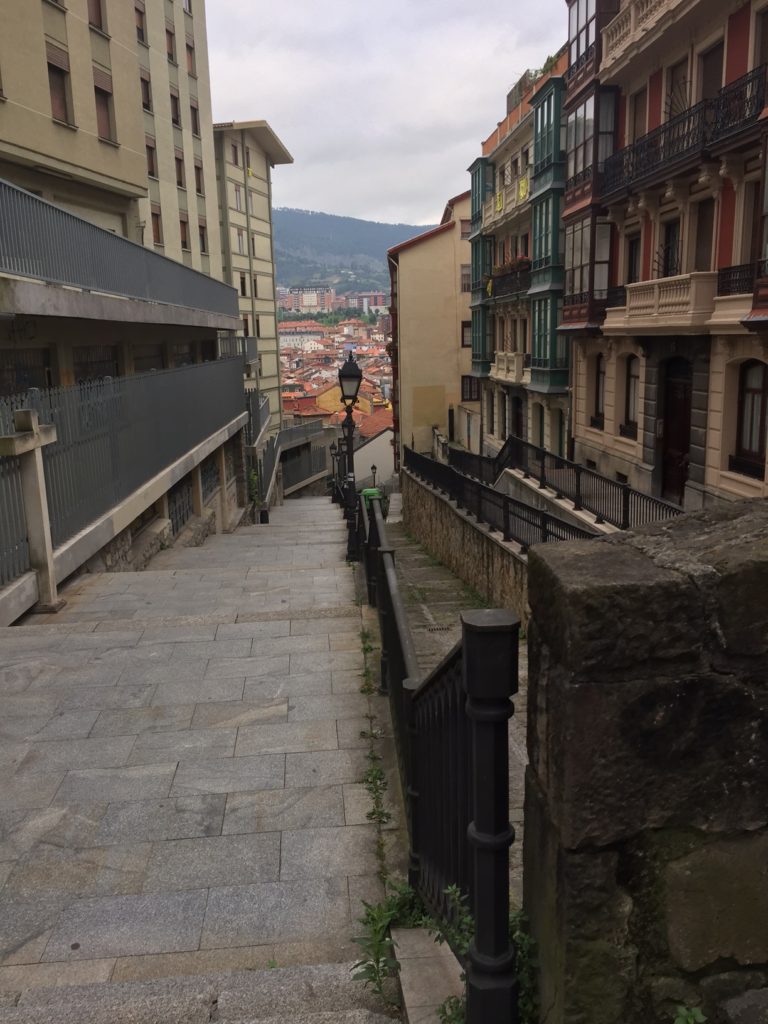
I passed her namesake cathedral and traipsed down a series of picturesque stone staircases with moss and ferns between the iron railings. The stairways followed the edge of a park downhill to the Casca Viejo, the old part of the city. Recognizing streets from my first day, I was able to quite easily navigate the old area and soon buzzed at the door of the Arriaga Hotel.
I bounced up the stairs and was warmly greeted by Begoña. She asked about my Camino thus far, and we enjoyed a quick catch-up as she flipped pages far ahead to book me a room for my last night. When we talked about my recent stay in the Basque farmhouse and learning some Basque history, she fished out – literally, using a paperclip – a pair of earrings she had been given, with the 4-petal swirl that is the Basque lauburu (“four heads”), a symbol of Basque unity believed based on the four elements earth, wind, fire, water. These earrings she gave to me as she told me, to my delight, that she and her mother were Basque! I felt honored to be given the lauburu, and such easy friendship.
“You forgot some items when you left,” Begoña said, and pulled out a bag of extra toiletries I had left by the trash in my room.
“No, no, you can throw those away. Or give them away. I had more than I could carry.” Begona nodded and put the bag behind the desk, looking surprised, with just a hint of approval that I might not be completely out of my element.
We shared an eye roll as the older American couple staying at the hotel interrupted our conversation about the Camino, stepping between us to announce they were going to breakfast. Begoña sent me off as well, with a fond “Buen Camino!” and more good advice, to see if a local bus would take me through the industrial area from Bilbao to Portugalete, as the route is isolated and unsafe, especially if one were to get lost there. I did not tell her I had already gotten lost, and called back, “Adios! Muchas gracias!” as I plunged back down the stairs.
I found the tourismo easily, and who should walk up at the same time – Pauline and Antoine! Backpack hugs all around, meaning you hug as much as you can reach, and a few minutes later, kisses goodbye, as they took the bus to the beach in Areña, and I took the underground Metro train to Portugalete. Distance to my Metro entrance – directly across the street.
I was entirely clumsy with my backpack, trying to walk in with the commuters in suits, getting stuck in the ticket gate; but, once on the train, I leaned back against the wall and watched in amazement as stations flashed by, little lights along a map overhead like shooting stars. What would have taken me hours of walking to each destination sped by, a minute or two at a time, and soon I was rising from the Metro station and then seated in a coffee shop in Portugalete, drinking cafe con leche and eating the best French toast ham and egg sandwich – pinxchos for breakfast! Perfect.
Hilarity was me trying to buy more bandaids at the farmacia. “No Compeed – bandages! Tapes, si, no not gauze, tapes already on, uh, tape? en cinta? tape? – yes! Si! Si! Gracias!” I had forgotten the word for bandages, which the pharmacist kindly reminded me was vendajes. But “tapes” got us through, and my blisters were very thankful. The pharmacist even walked me out the door and pointed the way to the Camino…possibly so I wouldn’t try to buy anything else, possibly just out of kindness.
Today’s lunch: banana chips, peanuts, and – potato chips! Salty oily goodness. I ate this feast sitting on the beach at La Playa de Areña. I raised my water bottle and toasted Pauline and Antoine in absentia. Then I toasted Begoña. Then I toasted myself: “Look at me – using good judgment, taking advice, feeding myself well, communicating and getting where I need to go.” The entire day had felt like a celebration, one ridiculous small happiness after another, each deserving a shout of glee, a toast, a kiss, as goodness surrounded me like a hug around me and my awkward backpack.
Goodness in Spanish is la bondad. I liked to remember it as “the bonded,” being bonded to the good. Like the bonds I was forging with others were strengthening the goodness I was finding. Like the bonds were the goodness, tapes to hold us together, our unity our strength.
At the albergue, the donativo table held exactly what I’d been hoping for – hiking socks and a travel towel! I felt like Camino Goldilocks, miraculously finding “just right.” My socks were overheating my feet, creating more blisters with each day; my towel was too small, and I luxuriated after my shower, wrapping myself in feather-light chamois softness.
I ate dinner at a nearby taverna with Francesca and a new friend, Felicida, a medical lab director from Mexico. Her name meant “Happiness.” My new friend Happiness. We shared the Peregrino Menu, a bottle of wine, and much, much laughter.
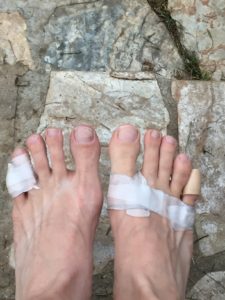
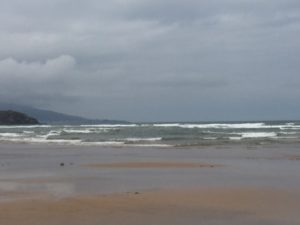
November 8, 2017 / wanderinglightning / 0 Comments
Gorma traveled down into a valley that was most pleasant. It was morning, and birds sang for the delight of a new day. Apples and pears hung full and sweet from the trees in the cool air, and the raspberries growing along the fences and stone walls were nearly ripe. A small stream trickled through the valley, winding between the stone farmhouses with their red tile roofs.
Gorma was watching the cows drinking the clear water and grazing the thick grass, their bells clanking under their sturdy necks, their tails swishing gently. “Yes, butterflies, it is time to walk,” she had just finished saying to the sweet flutterings dancing before her, when there, in a wide place on the path, stood a beautiful young woman.
Her smile was magnetic, her hair the color of living iron, and her body powerfully strong. She stood still as a statue, just a few feet from the rippling stream. Gorma stood beside her for a full minute, which is a very long time to wait. “Have these waters cast a spell on you?” Gorma finally asked, knowing that to name a spell begins to break it.
“Yes and no, Gorma; yes, and no.”
“Ah, so true. Tell me more,” replied Gorma.
The young woman was Francesca of the British Isles, and no stranger to little brooks and rivers, nor to the rain storms that refilled and refreshed them. But lately, things had taken a most difficult turn. “If I dare even to touch a drop of the water, a sudden storm arises out of nowhere, and I am struck by lightning! A little bird may splash its feathers in a puddle, and if one feather’s-worth of water touches me in any way – flash! The lightning strikes and I awake later, off in a meadow. The morning dew on the grasses along the path was trouble enough to pass safely, but this stream – oh Gorma, Gorma, what shall I do?”
Gorma nodded seriously. “And to top it off, you must be so thirsty.”
“So true! How will I live without water? But how can I live with it? Oh Gorma, Gorma, the lightning has driven me from my beautiful Britain forever, I fear.” The thought of it made Francesca’s lip tremble, but she dared not cry, not even one tear.
“The Country of the Heart cannot save you from the lightning, Francesca. The Heart is a wet and weeping place at times, and lightning pulses through at every moment, causing the beating of the rhythm of the seasons. So the lightning must not end, Francesca. If it were to stop completely, all life would end.”
Francesca’s lip trembled again, as she stood like a statue next to the little stream. “Oh Gorma, Gorma,” she whispered. “What am I to do?”
Gorma looked into Francesca’s eyes, and Francesca saw there the answer. “What must be done, must be done, and no help crying about it,” Gorma said with a wink. She smiled. “You cannot help that you are a lightning rod, Francesca. You are strong and alive, and so the lightning finds your mettle attractive – so attractive, it sometimes gives you more than it should.”
“Therefore,” Gorma continued, “the lightning must be shared, as all brilliant moments of curiosity and understanding are shared with us, from the Great Aha, the universe, which has no other name, yet many names. The lightning is in the skies – and within each of us.”
Then Francesca looked back into Gorma’s eyes, and seeing flashing there a familiar light, she reached out her hand to Gorma’s. In that moment, they shared a look of mischievous expectation, and respect. For it is the lightning-quick minds among us, those lightning rods endlessly asking for deeper meaning, who are gifted with the white light of flashing insight. Gorma knew that only the hand of another can ground the lightning rod back to earth, for that touch allows them to drink the waters of creativity without losing themselves into the storm. We must hold hands with the lightning.
Francesca stepped across the bubbling stream and strode up the path, confident and brimming with new ideas. And Gorma walked on, quiet and smiling. She arrived at the next albergue just in time for a bed, for which she was very grateful, and she slept deeply. Outside, a storm grew, and thunder and lightning rolled through the dark clouds. But Gorma was not afraid, and neither was Francesca; they were excited, even as they dreamed.
Buen Camino, Francesca.
November 8, 2017 / wanderinglightning / 0 Comments
I have fear of the Old One
Primitivo
it is said
He breaks us on the walls
that are His paths
using our hands to walk
the way so steep
we claw
our way to the stormy sky
above
the way we know
we are alive
Let’s just get this out of the way: I was a gifted child. Not the cool kind that can play Mozart sonatas on the piano by age 6, though I would have killed for the chance. I was a gifted poor kid. So I could only be gifted at what didn’t cost money.
That translated to being a brilliant student. My sisters asked for coloring books; I requested the next level math workbook. I did them for fun. By second grade, I was struggling not to answer every single question my teacher asked the class – as soon as she asked it. It was viewed as a behavior issue, like I was an arrogant know-it-all by the ripe old age of seven. She didn’t understand: I couldn’t help it. The words just tumbled out the instant my brain made the connection. It felt completely involuntary. Our desks were arranged in a circle in the classroom; mine, however, was pulled from the circle. I sat in the corner, near the pencil sharpener on the wall, next to the army green metal trash can.
Even while being reprimanded and ostracized, my standardized test scores rocketed off the top of the scale. I didn’t learn my subjects, I mastered them, dominated them. Without effort. I couldn’t help myself. I couldn’t save myself. I was labeled “gifted,” pulled from my circle of friends over and over each year to attend “enrichment” programming. I felt branded, seared and scarred by my own intellectual “specialness.” It felt like weirdness. I felt alone.
Though the public library was a magical place of wonderful children’s stories and fairy tales, I had an affinity for biographies. I wanted to read about real people who accomplished amazing things in the real world. So instead of reading about zoology, I read about Jane Goodall; instead of electricity, Thomas Edison. For fun I read Laura Ingalls Wilder. But even though she was a farm girl, her life was nothing like mine. I never read about anyone and thought, hey! they’re just like me. Because my story was a mess.
Yet, I wanted to be the Mozart prodigy. On our farmhouse windowsills, I played imaginary etudes, elegantly placing my little fingers to elicit transcendent pretend chords. I went so far as to make a full-size piano keyboard – out of paper, standard sheets of blank paper taped end to end, the keys carefully measured and drawn in with pencil, a sacred scroll I would unfurl to practice piano music that never materialized.
Instrumental music began in fourth grade. A different cousin handed down her old clarinet to me – and so I learned to play the clarinet. As in my other classes, I quickly mastered reading music and playing the instrument itself. While I couldn’t play those transcendent chords myself, I could hear them when we all played together. I could feel it – a shiver runs tingling up your spine when you play beautiful music, no matter how fleeting the moment of beauty may be. I found refuge in those moments, and kept playing.
All my life, I’d been a singer, too, with a natural ear for pitch, raised on Lutheran hymns in a white clapboard, small town church where our fathers took turns pulling the thick horsehair rope to ring the church bell each Sunday. My father’s family could all carry a faithful tune, led by their Swedish mother and Danish father, accents notwithstanding as we were taught to lift our voices high. I loved to add my voice to everyone’s around me, hearing the sounds swell and rise like a flock of birds. Yet it was my unpredictable, vengeful mother who could truly sing, with the voice of a dark angel, sad and low, sometimes wistful, often hauntingly beautiful.
While I was chosen for choir solos and sextets in my old school, when we left the Midwest and moved to Colorado, I had to audition at my new junior high. The song we were asked to sing: The Star-Spangled Banner. I began to sing it in my natural alto. The teacher stopped me. “Let’s start it a little higher.” I started again. Before I finished, she stopped me again. “You’re scooping your notes. You need to hit the notes straight on.” I resumed where I’d left off. “Don’t slide into them. Now again.” I tried again, removing any trace of personal expression or feeling, trying to hit the notes perfectly. “You’re still scooping your notes. You can’t sing choral music unless you – ” but I was already walking out the door. Hurt and embarrassed, all I heard was, you don’t sing right. I didn’t understand; I sang for her as I always had. Humiliated, I never went back.
By the time I got to high school, my brilliance had become frustrated and cynical. I had developed a thick defensive shell that I maintained with a wickedly clever tongue, acing courses as I ditched half the actual classes. I fought the mundane system by arguing brashly with my teachers to “teach me! I’m the best student you’ve got, I want to learn. Teach me!” That approach eventually earned me two D’s and an F the final semester of my senior year. I decided civil disobedience was a crock. I’d said my truth, and rather than be jailed for it like Gandhi or King – no one cared. I fought the law of averages, and average won. No one wanted brilliant. Again. As always. Especially angry brilliant.
As I entered the orchestra room, I would feel it shift. Music folder on the stand, open my case, twist the clarinet together, slip in a reed and warm up by drawing a soaring chromatic run up, up, up to the highest breathless notes, a pause, then plunging down down down, faster and deeper into a low, still pool of calm tranquility, meaning made of sound. My refuge, week in, week out.
I played first chair, always. Not because I was competitive and defended my seat; I was just…first chair. Playing came easily to me, and with my long pianist’s fingers, I could nimbly follow what my eyes read on the music staff. Here, my voice was always right. Here, I played the notes that were written for me, followed the rules. I practiced religiously, to get it right, all to channel those ephemeral moments of beauty.
So when my band director announced All State Band tryouts, and my orchestra director announced All State Orchestra tryouts, I said, “No thanks.” I didn’t want to “try out.” I had no interest in competing with others to “make it.” I got away with my polite refusal one year. But by the next year, the pressure was on. Again I said, “No thanks.” I tried to explain my feeling. “I can’t – I just, I don’t do competitive…art.” It fell on deaf ears. I earned the ire of my band director, the disappointment of my orchestra director. I was the talented player who would promote their music program. Suddenly, my brilliance was attractive – as a commodity. My refuge was disappearing.
My senior year, a new policy was instituted: all first- and second-chair players were required to audition. Mandatory. I went to each of my directors. “Don’t do this,” I pleaded. “I won’t do it,” I warned.
Audition time came. “Are you ready?” they asked.
“Didn’t practice; I’ll be sight-reading,” I replied. After the terrible audition, I looked back, gaze level, before I walked out: “I told you, I don’t do competitive art.”
In that moment, civil disobedience was not a crock. It had been the only way I could live with myself, in the small world I was living in. But walking down that hallway out the front doors of the school that day, I felt misunderstood, and alone once again.
Mine was a lone fist raised in protest, which just makes you look like a rebel without a cause. Leonard Cohen was not going to join me, “clenching your fist for the ones like us who are oppressed by the figures of beauty.”
* * * * * * * * * * * * * * * * *
“So, where’d you go when you skived off?” Francesca asked with a knowing grin.
I pulled on a loose shoulder strap to tighten my pack to my back. “To drink coffee and write poetry.” I stopped for a drink from my water bottle.
“Oh! So not much different than now, really,” she quipped, laughing at me.
“That’s right,” I replied, chuckling as I wiped my mouth and tucked my water bottle back in its pocket.
“And what did your parents say when they found out?”
“They didn’t – I had already left home by then.”
Not yet 30, Francesca nevertheless had become my best walking buddy. A much faster hiker than me, still she would often walk along with me to talk, or stop for cafe con leche and rest our feet, comparing albergue blister surgery stories. Her Londoner’s wit was scathingly direct and wonderfully clever, deliciously sharp smart commentary on whatever topic we were discussing, my favorite being her political commentary. She was thoughtful and generous with her attention, as well. I valued her insights.
Francesca was walking the Camino promoting epilepsy awareness – based on her own experience. I was amazed that she planned to hike to Santiago, but she responded that with her latest medication, she had been seizure-free for nearly three years, and decided it was time to go. Her parents and her partner were supportive yet nervous; Francesca, however, was liberated, boldly striking out on her odyssey. Internet in hand, she posted a daily educational fact about epilepsy, along with a trail photo, linking her chosen charities to the power of the Camino de Santiago.
Unhappy with a turn of events at her job, she had faced down an ethical dilemma by speaking out, shining a light, and making the decision to engage with what appeared at first glance to be negative consequences. The first truth was: she was frustrated and disappointed. The final truth: she was free.
Just like with the epilepsy. Oh, the seizures might one day strike again, probably would, unfairly, inappropriately, maddeningly. But seeing her world clearly and honestly, with no expectation that it would be fair, she now took it in stride. She had a pilgrimage to walk, choices to make about what came next. Her courage was her greatest beauty.
I thought about the irony of her brilliant, shining mind suddenly overwhelmed with electrical impulses. I felt a kinship, for all the times my world had short-circuited without warning. The times I came home late from work after school to be greeted by my mother’s wrath that I didn’t do the dishes despite having not eaten at home for two days. The times she slammed kitchen cabinets in angry silence for days until unleashing venom on me for walking by. The times I disagreed with her and she called me a little bitch, sneering, “That’s why your boyfriend broke up with you.” The time she followed me to my room, snarling and vicious, and hit me across the face, knocking off my glasses. The time I decided to leave. When I was seventeen. During my senior year of high school.
There are no tryouts for these roles, Francesca’s and mine. You are born into them. You just get struck – then you see if you can take it. You see if you can figure out a way to harness all that energy, and not let it destroy you. You have to be made of iron. You become a lightning rod.
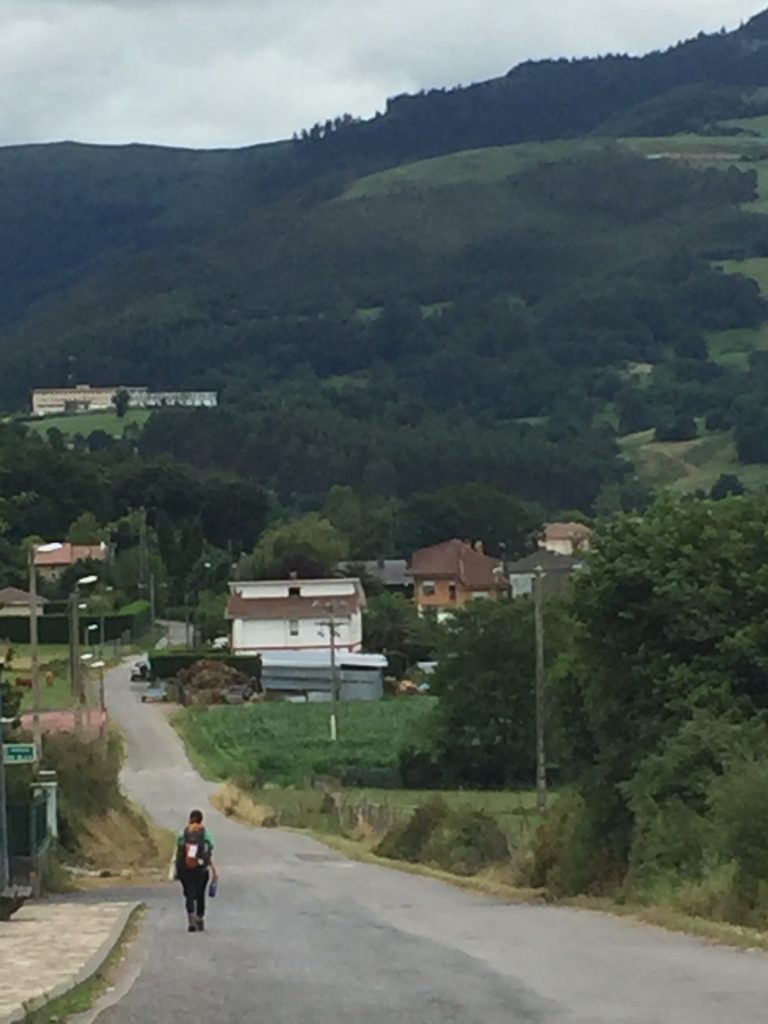
Francesca leads the way. Buen Camino, Francesca
November 7, 2017 / wanderinglightning / 0 Comments
would you sell your house
to find
your home in the world?
No longer following my guidebook explicitly, I had split the trek from Gernika to Bilbao, with two evening options for albergues midway. And yet, at about 2pm, I came over a rise and found a dream I did not want to leave.
Tiny preschool chairs were arranged at low tables in the wide stone driveway of an old stone farmhouse. At one table, a small red sign called out, “Beds for Rent!” and at another, “Albergue! Peregrinos welcome.” Two equally tiny dogs barked as I paused. I started to walk on, but intrigued, approached the house instead.
“Hola!” I hollered into the central patio of the home. A voice called indistinctly as the dogs continued to bark, their tales now wagging ferociously. I tried again: “Hola!” Voices rose inside, and a young boy ran out. I asked if he spoke English, and he said yes. I asked about the beds, and he ran back inside. Out came another boy, slightly older, who politely showed me inside to two hostel-style rooms added to the old house, or crafted from it. Tidy bunks, sturdy platform beds, even a low cot; one room had its own sink – and small writing table. I was enchanted.
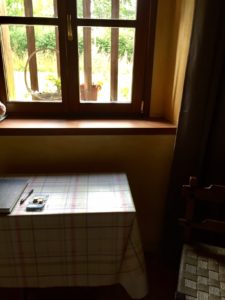 A white-haired grandmother slowly inched out of the door with her aluminum walker, her back bent painfully into a tight C-curve, one hand and wrist twisted into itself, wrapped in an elastic bandage. I greeted her in Spanish, but it sounded as if she spoke only Basque.
A white-haired grandmother slowly inched out of the door with her aluminum walker, her back bent painfully into a tight C-curve, one hand and wrist twisted into itself, wrapped in an elastic bandage. I greeted her in Spanish, but it sounded as if she spoke only Basque.
My little host was 8-year-old Martín, and he and 10-year-old Ander called their mother on the cell phone. She quoted me the same prices I had gotten from Martín, and so for the full 28 euros I got a clean bed in a rustic farmhouse, a long hot shower, a multi-course homemade dinner with wine and rich conversation, a full breakfast the next day, and best of all, the chance to meet Marisa and Gaizka, the married couple whose home and fledgling albergue I had chanced upon.
While we waited for Marisa to get home, I showed the grandmother photos on my phone of my grandchildren. When I showed her one baby’s funny expression and called him “La Tortuga,” The Turtle, we both laughed out loud. “Guapo,” she added softly, granting him handsome beauty as if she had waved a fairy godmother’s wand.
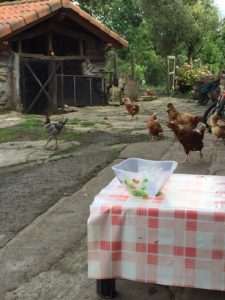
I spent my afternoon writing, sitting out front as the boys played in a hammock. Grandmother scattered corn for the chickens strutting through the yard; the gray-and-white dog snuggled up next to me to nap. The warm sun peaked in and out of clouds that gathered as the day wore on.
After a couple hours, two peregrinos I had met, Pauline and Antoine of Holland, arrived and were offered fruit and rest by our junior hospitaleros, as Marisa had returned only to leave again on another errand. I greeted the couple enthusiastically, and they asked if they could join me at my tiny table.
Antoine and Pauline were gray-haired, somewhere in their sixties, I guessed. They were celebrating 1000 km already, having started their Camino much farther back in Europe. Much farther back in years, too, I thought to myself, looking at their ease and kindness with each other.
Luckily for me, Antoine’s feet were tired. Extolling the glories of my oasis among the chickens, I had them curious, and so I showed them the two rooms. Marisa arrived back home and I made introductions; she excitedly thanked me for bringing in these two friends, who had, upon seeing the accommodations, immediately said “Yes!” and taken off their boots.
As she prepared a special salad for our meal, Marisa and I talked about the struggles of a mother at home with not two but three boys – there was also 3-year-old Gorka. She treated me like family, by turns confiding worries and taking courage, and we planned writing letters to each other to continue our chummy talks. At all praise for our beautiful clean rooms, Marisa shrugged off my words with, “It is just a house. It is only a house.” But what a house. She told me with obvious affection that this farmhouse was passed to her from her mother who lived with them, and from her mother, and back over 300 years. It was timberframe, stone, and plaster, and the feeling of it was simply: home. Textured walls painted warm colors embraced our travelers’ exhaustion in welcome, as deep windows framed the Camino out front, the garden with its apple and pear trees, flowers everywhere, and the far mountains beyond, encouraging us to continue our journey.
In the evening, we all sat at a long wooden table under growling skies that never rained, talking relationships, home, work, politics, purpose, and the value of taking the Camino slowly. Gaizka joined us after dinner for tea, teaching us about Basque history and culture. He explained that the Basque people are proud, strong and independent, fearless risk-takers, famous as sailors, navigators, athletes, and bullfighters. His children learned Basque first, then English and Spanish, at school; Basque was spoken at home. I learned that the tree I visited in Gernika (the Basque version of the city’s name) was the most significant symbol of Basque culture I could have chosen to see. Under this tree, the Basque chieftans and lords had met to make agreements and keep peace through their long history; the tree was the witness to their oaths, binding generations to their words as it continued to live on.
Gaizka’s Basque heritage showed through as he passionately told how Marisa’s mother was a child in 1937 when Franco had Hitler bomb Gernika during the Spanish Civil War – and Grandmother still remembered it. This would make her somewhere around 84 now. Pauline was a child psychologist, Antoine was retired, and I had just quit my long career as a caseworker with homeless people, so we immediately fell into conversation about the human costs of such intense experiences. Just as quickly, we caught ourselves, relieved at being a step removed on the Camino, not working for the moment with all the trauma of the world. And so we bonded over caring, and having chosen work that let us directly care about the suffering of others. We became friends in one night.
We understood, deeply, the need for a safe and loving home. I did not share how deeply I personally understood this, how profoundly unsafe I had felt at home as a child, for far too many years. How I resonated with grandmother’s childhood experience of bombs dropping, of chaos and the hopelessness of wanton destruction. Instead, we celebrated finding this sweetest of family homes, standing solid and strong over the generations, unshaken by the world around it.
At 2am, I woke to use the bathroom. As I tiptoed through the dark past the kitchen, I saw a soft glow, and there stood Marisa, damp curls encircling her face, busy near the warm oven. She had baked us bizcocho, a dense, moist coffee cake, for breakfast in the morning. I hugged her and we laughed in whispers that she would go to bed soon – and sleep in, late, while we all shouldered our packs with the first light.
The moon hung full and bright through wispy blowing clouds high over the Basque mountains as I snuck back to bed. A huge tree grew at the edge of the property, outlined clearly in the night’s soft light. It reminded me of the great tree of Bizkaia, of these people, this family. It endured; they endured. In Norse legends, the creation myths of my own ancestors included the Great Tree of Life, Yggdrasil. It embodied the very universe. What is done to the tree is done to us all. We are all family.
This was my dream for travel in Europe, for the Camino: this gift of warm friendship and loving kindness, of being welcomed into people’s homes and lives as I traveled through. Touched, I realized in how many ways I felt fed and nourished. Safe. To be myself.
I belonged, where I was, in that moment. I was home. I was so overjoyed I could not sleep, and contentedly watched the moon through the window of my bedroom, occasionally wiping a happy tear or two from my eyes. I fell asleep smiling, here in a foreign place I had never seen, but had always been searching for.
November 6, 2017 / wanderinglightning / 0 Comments
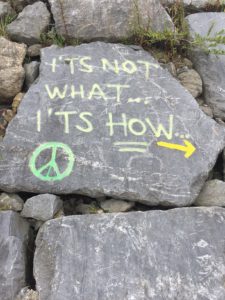
- If there is a seat, sit.
- If you sit, eat.
- If you eat, drink.
- If you can carry more water, carry more water.
- If it’s 3pm – stop walking.
November 6, 2017 / wanderinglightning / 0 Comments
Sometimes, we get lost. I had lots of time to think about this today, as I kept recovering from multiple missteps. The Camino giveth yellow arrows, and the Camino taketh away.
I got lost at the edges of cities, trying to find my path where it crosses those of others, knowing it existed but unclear how to find it. Like what to do with your life: sometimes, you take a wrong turn, or follow a sign that leads you wrong. Vandalism covered or changed some of the arrows I needed – signs twisted, yellow scratched out or brushed over with gray. I sighed as I admitted I had lost my bearings yet again.
The trick was to ask for help. However, this was not my forte. It was not even my baseline – it was my Achilles’ heel. I was a go-it-alone girl in a kick-you-when-you’re-down world. But now I was getting lost in strange cities in a foreign country with minimal language skills. I felt a persistent niggling in the back of my mind to consider what vandalism to my heart had obscured the arrows I needed in life to find my way.
Sucking up the useless pride of the hopelessly lost, I asked for help. And since I seemed to walk alone so much, I asked for directions over. And over. And over. When I felt like I was headed in the wrong direction, I stopped, apologized to some local person living their life, and asked the way. Typically, I was about to miss my turn if I hadn’t asked.
Traveling with others, it was so simple. I exchanged listening to Americans discuss TV shows for the surety of multiple heads finding the way together. So much easier. Except that I don’t watch TV and had no idea what they were talking about. I preferred my solo time. Peregrina sola.
By the time I got to Itziar, I was so tired. And alone. Without thinking, I followed the yellow and white stripes that often replaced the yellow arrows through towns. Unfortunately, these particular stripes marked routes joining the Camino from other mountains. But without arrowheads, you don’t know that. And without asking, you sure don’t know that. So I followed them up the wrong mountain.
That’s right. For a couple of hours, I hiked a steep, rocky path in the completely wrong direction. I heard a vehicle, and turned behind me to see that workmen were hauling building materials to the top of this mountain with a huge ATV truck of some sort. One guy hopped off and asked me where I was headed, where I came from today. When I told him I came from Zarautz and was going to Deba, I gestured up over the mountain.
“Deba? No Deba,” he responded, pointing clearly up my mountain – which I had nearly summited. He pointed back down to the last town, traced his finger completely across the valley, then over the opposite mountain instead. “Deba.”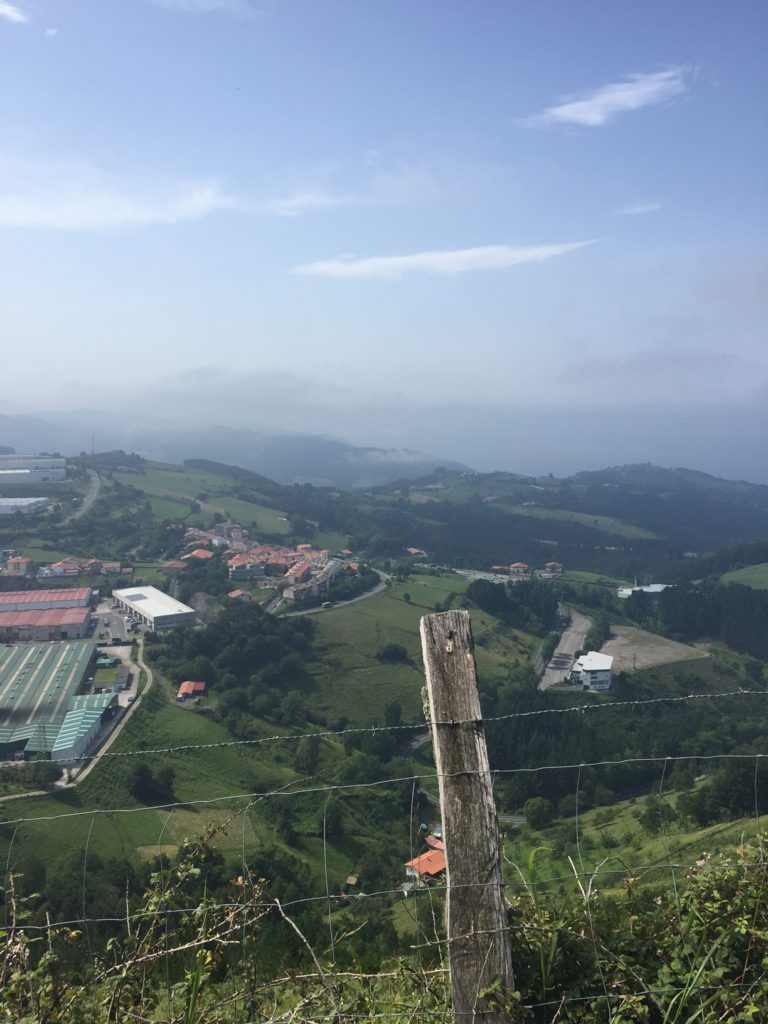
I heaved a heavy sigh, then smiled wanly. “Gracias. Buenos dias.” What else was there to do?
So I walked back down the long trail, humming, “We’re on the road to nowhere…,” which seemed to be my official theme song now. I got down to the road leading into town. I stopped at the gated house of a family and called out, “Ayuda por favor? Necessito agua, por favor.” Judging by my beet-red face, heavy backpack, and obvious air of exhaustion, the mother took my empty water bottle, wisely left this dusty, desperate peregrina outside the locked gate, and brought back cold, clear water. “Muchas gracias, muchas gracias,” I panted, then turned and gulped sloppily. Lookin’ good, sister, I imagined 17-year-old me saying from beside me. You have this thing totally handled.
Stowing my water, I started walking again, when an older man hailed me from the bus stop, walking across the road to me. “Peregrina?” he called, or his word meaning such, as there were so many languages in this part of Spain. “Is something wrong?” I think he asked. “Where you go?” I figured out.
“Deba.” He looked puzzled. I pointed, exasperated with myself, up the wrong mountain I had just descended. “Camino de Santiago de Deba? NO.” I pointed across the right mountain. “Deba.”
He looked genuinely concerned, and sympathetic to this clearly incompetent pilgrim sweating profusely under her burden of self-sufficiency. “Autobus de Deba,” he told me, as if solving the matter. “Un minuto.”
“No no,” I protested.
“Un minuto.”
“Camino a pié,” I protested again, as if I hadn’t already walked enough kilometers to more than match the distance ahead. I then looked at my watch: it was 5:30pm. “Albergue,” I said in resignation, watching the second hand sweeping away my chance for a bed that night.
Thus did my savior San Juan pay for my bus with his bus card, as his friends San Antonio y San Fernando chimed in, helping me stuff my backpack into a seat. They kept up a cheering, happy banter, and told the bus driver where I needed off, the tourist office. I kissed Juan and Antonio goodbye as Fernando, who kept hoping and asking if I spoke French, walked me to the tourismo.
The guía in Deba was matter-of-fact. “The albergue municipál is full – completo. But you can get a start on tomorrow if you walk to the next albergue.”
“How far?”
Five kilometers away.”
A 5K at the end of a day of mountain hiking. That’s only three miles, only three miles, I kept telling myself. I arrived at my albergue at 8:30pm – where I found a plate of hot food waiting for me.
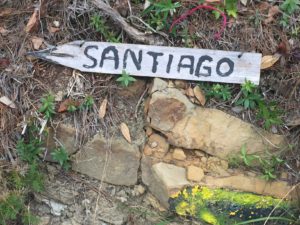
Asking for help is not a weakness. We need each other, like I had needed the construction man’s pointed advice, the mother’s clear water, and the gift of being transported by the saints. Guidance merely keeps you on the way; it doesn’t walk the walk for you. These were all gifts, of openness, empathy, and compassion. They all brought me clarity.
I felt like I had gotten away with my final act of peregrina obstinada, gotten off easy, and vowed I had learned my lesson about asking for help. If I hadn’t, I would have blown out my Achilles’ heel for real, on an unnecessarily steep and rocky mountain of my own choosing. I could feel 17-year-old me grinning at me as we walked along toward the albergue in the descending twilight, putting a tentative arm around my waist. Such a crazy rebel, she scoffed affectionately, our feet aching.
As I said when I kissed Fernando goodbye: “c’est la vie, no?”
three Basque saints, kind upon their shining thrones
in the plexiglass bus stop
erremos?
peregrina?
he calls to me, San Juan crossing the road
who pays for my burden and my mistakes
and my bus fare to Deba
they are all baptized in vino tinto
Rioja!!
and smell as bad as I do
smell as
saints who’ve lived
San Antonio sits across the bus aisle
he encourages me in my doubtful moments
and gives me a smile
to carry along the Camino
San Fernando offers words and passion
jokes and laughter
safeguarding my passage
through the twists and turns
of this town
this life
walks me to the bridge beyond
and gives me my name as a canto
I offer back a kiss goodbye
each one my humble
gracias
for the gift
of coming to my rescue
November 5, 2017 / wanderinglightning / 0 Comments
Gorma’s camino led through thick pine forest across the tops of the blue mountains. Ferns covered all the ground, and as the drizzly rain fell through the trees, it dropped onto the ferns’ large leaves like tiny bells: ting, ting ting, ting ting. The air felt warm and close, like a hug, and Gorma became dozy.
Suddenly, she heard a deep sound, less a growl than a rumbling of the air, the sound we hear when we must confront our fate. Gorma stepped carefully, slowly as always, watching the ferns for any rustle-rustle, looking left, then right, then left again. Just as she looked backward over her shoulder, a bear stepped onto the path ahead of her, and this time it did growl, for Fate will often speak your name in a language you do not understand.
Gorma turned back around and stopped, facing the bear. “Why do you growl at me, Bear?” Gorma asked in that way she asks, for she was not afraid.
“Gorma, Gorma, you disturb my walking with your slow, heavy steps – stomp, stomp, stomp. It is un-bear-able! So – I will have to kill you and feed you to my cubs.”
“Ah, you have cubs? I understand perfectly,” replied Gorma, nodding her head.
The bear looked rather discomfited by this response and tried again. “You see, they are the most precious of cubs – magical cubs – because of their father, the Djin of the Desert. He has gifted them them with mystery. Yet, I fear their magic will become dulled and ordinary in the world, so I protect them, here in this deep forest in the Country of the Heart.” The bear faced Gorma with sure determination.
“Yes, of course,” was Gorma’s only reply. She smiled pleasantly at the bear.
“But Gorma, Gorma, don’t you understand? I cannot have you here, so close to us, disturbing my walk of protection around them. And you are so slow, Gorma – so, for this – do you not see? – I will have to kill you and feed you to my cubs.”
“Yes, Bear, but before you do kill me – and I have cubs of my own, with cubs of their own, so I do agree you must kill me – but tell me, what is your name?”
The bear cocked her head one way, then the other, left, then right, then left again. “It is Kati.”
“Ah, Kati Bear! So good to meet you. And how long have you called this forest home?” Gorma smiled with deep kindness right into Kati Bear’s eyes, so that Kati’s eyes grew cloudy, like a rain about to fall. For this is the power of the smile of a friend.
“Oh Gorma, Gorma, this is not our home! I march through this forest, around and around, circling my cubs because I am afraid they will lose their magic. I am Kati Bear of Germany, a strong German bear who is not afraid of anything – except this. The Djin must visit the desert each year, which restores his powers. And I…I hide here with our cubs.” Kati Bear looked down at the path beneath their feet.
“Yes, Kati Bear, I see the problem,” nodded Gorma kindly. “But why, if I may ask, is it my slow slow walking that will be the death of me?”
“It is – it is – it is because of the rain,” Kati Bear stammered.
“The rain?”
“Yes, Gorma. It takes so long for you to pass our hiding place, and I must stay so still in the rain, not a rustle-rustle of the ferns to give us away – so I cannot shake the water from my fur, and it becomes so very heavy.”
Then Gorma knew what she must do, for she understood this heaviness. “Yes, the blessing of the mother, La Mar, is not easily shaken off. Yet, now you have been blessed, so I can give you this.” And reaching into her pack (which was curiously the purple blue color of the water and the evening sky, the flowers in the meadow and the butterflies who traveled the Camino with her), Gorma pulled out a rain cloak made to cover her pack, which was just big enough to cover a bear.
“This is for you, Kati Bear. Use it until you no longer need it; then you can give it to another. Perhaps on your journey to join the Djin?”
For Gorma knew that Kati’s cubs could already dodge the raindrops with their joy, which is the source of the Djin’s magic, as anyone knows; happiness and tenderness are the flowers that bloom in the Great Desert, after all. And those just happened to be the names of Kati’s cubs.
We think our strength and vigilance will protect what is most precious, what we hide deep within the Country of the Heart. But if you befriend your fate, it is there you free your magic and your mystery.
So Kati Bear returned to her cubs, and Gorma walked on, quiet and smiling. She arrived at the next albergue just in time for a bed, for which she was very grateful, and she slept deeply. Outside, the drizzly gray lifted, and stars twinkled over the blue mountains.
Buen Camino, Kati.
November 4, 2017 / wanderinglightning / 0 Comments
center of the shell, an ear to hear
all my longings all my stories
center of the shell, an ear to hear
all my days
center of the shell, must I be
at the mercy of these waters
center of the shell
will you wash away with me
— chorus of “Center of the Shell”
The Camino offers guidance, if you’re willing to follow it. Yellow arrows point the way, formal etched Camino signs direct you with kilometers to the next village, bronze scallop shells are sometimes embedded in sidewalks to escort you through towns, plus you carry a guidebook, and sometimes can even find detailed local maps at albergues or tourist offices.
It hit me as I hiked along: I’d gotten more guidance from the Camino in the couple days I’d been walking than I’d gotten from my mother in a lifetime. Such a jarring revelation, seemingly out of nowhere. She was always ready with judgment, but never guidance for you. For me. Maybe it was easier to say “I told you so” than it was to come up with original words of love and inspiration.
I wasn’t enraged by it any more. With age, and a succession of 50-minute hours with counselors, I had come to understand her hard story growing up. Which had become my hard story growing up. And while I understood the story, I remained convinced that we can choose how we respond to our circumstances. You don’t have to choose harsh judgment and critical condemnation. Yet here I was, walking a Catholic pilgrimage route, images of a crucified Christ, judged and condemned, greeting me from every cathedral and graveyard like a sad uncle in the corner of the family home.
I knew my mother just practiced what was preached to her, just another sinner in the hands of an angry family god. I understood it – but I needed to get beyond it. I had written scathing poetry, sung disappointed songs, given her ultimatums, boundaries, and the silent treatment. Nevertheless, here she was, following me onto the Camino like a stray dog. I was so sick of being sick of her.
Time heals all wounds. What a lie. Time just makes them old wounds. I had tried scourging them away, with anger and fiery words and storming through my stormy younger years. Seventeen-year-old me gave me the wry, then melancholy, smile of a comrade-in-arms. A good job of choosing how we respond to our circumstances, she chided. Hmm…point taken, I thought anew as I trudged up another hill. The self-righteousness of the abused and neglected can become oppressive in its own right. Martyrdom without a higher cause is just another burden of resentment to carry over many years.
Writing every day, I felt my core sense of self strengthening, like working muscles grown soft. The fluidity of time on the Camino was taking me back to my earlier days as a poet, those times of ragged words hoarse in the throats of true believers, shouting our glory across summer nights of crowded coffee house alley cat back fences, egging each other on with vivid portraits of muddy love and tongue-rolling sex and the depths of our hearts we knew nothing about, young word junkies floating strung out and serene after the violence of stabbing performances of imagery and sound. I remembered being 26, 27, 28, getting better with age, reading at invitation-only events, the microphone close and sensual, the spotlight a waterfall washing me away to nothing but my voice.
My identity became fluid. The hospitaleros, the volunteers who ran the albergues, kept questioning my age when I checked in. One finally told me, “Fifty-one? No, you are forty-one, or forty-two at the most.” I was aging down, growing younger on the Camino. I walked past farms and smelled manure and silage and cut hay fields drying in the sun. I’d say out loud, “Remember the farm? Remember?” to my younger self. I imagined her responding with a snort, flipping her hair out of her eyes as she watched her boots scuffing along the trail, Um, did it always smell like fish?
A farm by the sea: a dream I never knew existed. Growing up on 300 acres in the middle of nowhere in the middle of the Midwest, I was a bound child, landlocked to flat plains, no mountains, no oceans. But my adventurous spirit found release in the one great expanse of wilderness available – the sky. That endless sky was the source of our lives on the farm, and walking out past the fence lines, I would simply let go and lose myself in it.
When all you see around you is more open space around you, it feels like time is standing still in a breathless quiet, or stretching long and lean like fast-moving clouds on a high wind, or piling day upon day upon year upon year into thunderheads of a life that appears dark and heavy. I learned to read the sky, to watch for rain, and the eerie gray-green of a tornado about to descend, about to plunge my small world into blackness. I had no experience of the ocean’s power, to give life and to take it. But I knew the vastness of the sky, by sunlight, cloud, or stars. A sea above me, bringing reminders of its waters with every rainfall, beckoning me to find my way, navigate my life with every constellation I learned to name in the pure darkness found in the middle of the middle of nowhere.
this road leads me
out to rocky beaches
this beach leads me
into stormy seas
center of the shell, an ear to hear
all my longings all my stories
center of the shell, an ear to hear
all my days
center of the shell, must I be
at the mercy of these waters
center of the shell
will you wash away with me
* * * * * * * * * * * * * * * * *
I was delighted to see the water station set up by a man who built his own rickety table-and-altar affair. He had his own sello that you self-stamped onto your credencial. As I rested and drank, I met a local retiree named Rudolfo, engaging even though he had little English, so we did our best to communicate. He wanted to keep in contact by Facebook, and when I said I had no Facebook, he asked if we had internet in Colorado.
The flow of communication and guidance can be similar. We want to be understood, yet without learning the words for our experience and dreams, without the subtleties of tone to convey our feelings and hopes, we cannot express our thoughts or questions effectively, so we start guessing, making assumptions, or getting frustrated and walking away. When this happened with Rudolfo, it was hilarious. When it happened with others in my life, the distance was immeasurable and aching. I needed guidance, and not just about my Spanish vocabulary.
As if in answer to my contemplation, I came upon a natural spring pouring forth along the Camino. Signs on boulders attested to the water’s purity, and were painted so similarly to the rickety water station that I wondered if the same person watched over us, we thirsting peregrinos. I filled a half-empty water bottle and took a taste off the top. The water was clear and slightly mineral-tasting. I sat and had a snack and read my guidebook under the green trees, birds singing everywhere.
When it began to drizzle a mist of rain, I resumed walking. I was alone. I hiked along slowly, absorbing the pace of the wet forest around me. Everywhere, water dripped from leaves that glistened in the late afternoon light. My feet were beginning to ache after another day of long distances. I stopped, resting, listening. As I was leaning on my walking stick, drinking from my water bottle, a man appeared from behind me on the trail. He smiled, and I smiled back, offering, “Hola.” He continued to smile, and stopped to take a drink from his own water bottle. His black beard was thick, his black curly hair beginning to gray, and his dark eyes – unquestionably kind. He asked me something I did not catch, and as we asked two- and three-word questions, we quickly found that he spoke Portuguese, and I spoke English, plus my handful of Spanish words. I gestured to myself and said, “Barbara.” He touched his heart and answered, “Hernani.”
Yet I understood that he, too, was a peregrino, like me. I could feel his gentle kindness and concern for my slow pace and sore feet, which we both pointed at and spoke about in words the other could not fully understand. But we got the gist of each other’s meaning: compassion, acceptance, friendship. He made sure I had water and could walk the rest of the way, and I gave him my thumbs-up and smile, so he smiled back, waving and saying sweetly, “Buen camino.”
“Buen camino,” I returned. Then he led the way forward, and I followed, long after Hernani disappeared from view. I followed Hernani’s “good way.” I followed his simple kindness. I followed the way he named himself as he touched his chest, as if his name and his essence emanated from his heart. I followed him through a magical forest landscape filled with huge ferns and wild hydrangea, the arched stone of a Roman aquaduct rising from the lush greenery and carrying me across the final hill as if floating its long-ago waters. I was learning to find my way, which in Portuguese is to “encounter my camino.”
My path was starting to show itself to me. And I was learning to navigate by what shines from within, with guidance from those who could shine their light upon my way. My creativity itself was stepping forward, as words began to flow again after years of neglect; instead of dwelling on ancient history, I found poetry and lyrics filling my mind, humming a new tune down the trail.
When I reached the beautiful old building that was the albergue, I found it immaculate. I washed my clothes, hung them on the line, then after Compeed for my blisters, walked carefully down to the beach in my flipflops. Children played in the shallow water as new surfers practiced with their boards in the easy waves. I got a tasty supper of pinxchos and local wine and sat at a table just off the beach, watching the sea for hours. All I saw around me was more open space around me, and time stood still and quiet. I stayed until the sun set, merging sea and sky, the first stars appearing over the water.
what way can I
safely make the journey
what boat can I
build to sail the seas
center of the shell, an ear to hear
all my longings all my stories
center of the shell, an ear to hear
all my days
center of the shell, must I be
at the mercy of these waters
center of the shell
will you wash away with me
— “Center of the Shell”
 I got a gelado on the beach promenade, licking it beneath the huge statue of the working woman, her apron tucked up, her arm missing like all good classical statuary. She was strength personified, larger than life, and I immediately loved her.
I got a gelado on the beach promenade, licking it beneath the huge statue of the working woman, her apron tucked up, her arm missing like all good classical statuary. She was strength personified, larger than life, and I immediately loved her.










